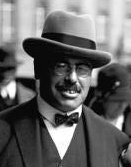A Quote by Christopher Voss
People typically only believe they're in a negotiation when dollars are involved. And maybe sometimes they're smart enough to see if there's a commodity that you can count being exchanged. And, of course, the commodity that we most commonly exchange is money.
Related Quotes
In reality, every single negotiation involves another commodity that's far more important to us, which is time - minutes, hours, our investment in time. So even if you're talking about dollars, the commodity of time is always there because there has to be a discussion about how the commodity of dollars is moved.
Money is different from all other commodities: other things being equal, more shoes, or more discoveries of oil or copper benefit society, since they help alleviate natural scarcity. But once a commodity is established as a money on the market, no more money at all is needed. Since the only use of money is for exchange and reckoning, more dollars or pounds or marks in circulation cannot confer a social benefit: they will simply dilute the exchange value of every existing dollar or pound or mark.
I don't even think about the money when I consider roles, I turn it over to my agency. Money will come. I respect it but I don't thirst for it. I wish Americans thought more like Europeans when it comes to money and work. They take time off, they do what they love. We think work is the most valued commodity. Really the most valued commodity is time.
Labor, being itself a commodity, is measured as such by the labor time needed to produce the labor-commodity. And what is needed to produce this labor-commodity? Just enough labor time to produce the objects indispensable to the constant maintenance of labor, that is, to keep the worker alive and in a condition to propagate his race. The natural price of labor is no other than the wage minimum.
There used to be a thing or a commodity we put great store by. It was called the People. Find out where the People have gone. I don't mean the square-eyed toothpaste-and-hair-dye people or the new-car-or-bust people, or the success-and-coronary people. Maybe they never existed, but if there ever were the People, that's the commodity the Declaration was talking about, and Mr. Lincoln.
I think a lot of longevity, especially as a performer, depends on kind of what your commodity is. If your commodity is your cuteness and your chubby cheeks and your big gap between your teeth, if that's what your greatest asset is, of course that fails or that changes, you know, that goes away. Of course that fades.
































